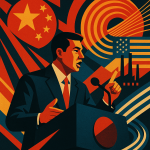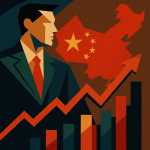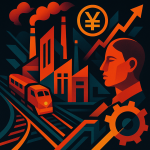Key Points
- The Chinese government has fully deployed ¥188 billion RMB ($25.9 billion USD) in direct subsidies for nationwide equipment upgrades.
- This initial spending is strategically designed to stimulate over ¥1 trillion RMB ($137.9 billion USD) in total investment, indicating a leverage factor of more than five times the government’s initial outlay.
- The funding is distributed across approximately 8,400 projects and is part of the “Two New” policies (二新), focusing on equipment renewal and trade-in of consumer goods.
- Key sectors receiving a significant boost include industry, energy, transportation, environmental infrastructure, healthcare, electronic information, and recycling.
- The National Development and Reform Commission (NDRC) emphasizes strict closed-loop management to ensure the effective and intended use of funds.

China’s latest move to supercharge its economy is a big one: a massive ¥188 billion RMB (approx. $25.9 billion USD) has just been fully deployed for nationwide equipment upgrades.
But here’s the kicker.
This initial injection is designed to stimulate over ¥1 trillion RMB (a staggering $137.9 billion USD) in total investment.
That’s a powerful signal for investors, founders, and anyone watching China’s economic strategy.
Let’s break down what’s happening.
The ¥1 Trillion Play: How China is Turning Billions into Trillions
On August 13, 2025, China’s top economic planning agency, the National Development and Reform Commission (NDRC), confirmed the news.
The funds come from ultra-long-term special national bonds—a serious financial tool for major strategic projects.
Here are the key stats:
- Initial Capital: ¥188 billion RMB ($25.9 billion USD) in direct subsidies.
- Total Investment Stimulated: Over ¥1 trillion RMB ($137.9 billion USD).
- The Leverage: This means every dollar invested by the government is expected to attract over five times that amount from other sources.
- The Scope: The funding is spread across approximately 8,400 projects nationwide.
This isn’t just scattering money around; it’s a targeted strike to upgrade the country’s core infrastructure.

Find Top Talent on China's Leading Networks
- Post Across China's Job Sites from $299 / role
- Qualified Applicant Bundles
- One Central Candidate Hub
Your First Job Post Use Checkout Code 'Fresh20'

Inside the “Two New” Policy Fueling the Fire
This massive disbursement is a core part of a broader national strategy known as the “Two New” policies (二新).
It’s a simple but powerful concept decided on by the Central Committee of the Communist Party of China and the State Council.
The “Two New” policies focus on two key areas:
- Equipment Renewal: Modernizing machinery and infrastructure across key industries.
- Trade-In of Consumer Goods: Encouraging consumers to swap old products for new ones, boosting domestic consumption.
The NDRC (Guojia Fazhan Gaige Weiyuanhui 国家发展改革委) has been working closely with other departments and local authorities since early 2025 to make this happen.
They’ve been fine-tuning the support scope and project standards to ensure the money goes where it will have the most impact.

ExpatInvest China
Grow Your RMB in China:
- Invest Your RMB Locally
- Buy & Sell Online in CN¥
- No Lock-In Periods
- English Service & Data
- Start with Only ¥1,000

Where’s the Cash Flowing? Key Sectors Getting a Major Boost
So, who are the big winners? The funds are being channeled into a wide range of critical sectors.
For anyone looking for opportunities, this list is basically a roadmap of China’s economic priorities:
- Industry
- Energy-consuming equipment
- Energy and electricity
- Transportation
- Logistics
- Environmental infrastructure
- Education
- Culture and tourism
- Healthcare
- Modernization of residential old elevators
- Electronic information
- Facility agriculture
- Grain and oil processing
- Safety production
- Recycling and circular utilization
The focus on areas like electronic information, recycling, and energy highlights a clear push towards a more modern, efficient, and sustainable economy.
- Industry
- Energy and Electricity
- Transportation
- Environmental Infrastructure
- Healthcare
- Electronic Information
- Recycling and Circular Utilization
- Education
- Culture and Tourism
- Logistics
- Facility Agriculture
- Grain and Oil Processing
- Safety Production
What’s Next? Ensuring Every Yuan Counts
The NDRC has made it clear that the job isn’t done just because the money is out the door.
Their game plan moving forward is all about execution and accountability.
Here’s what they’ll be focusing on:
- Strengthening coordination with all relevant parties to keep projects on track.
- Accelerating project construction to see “tangible outputs” sooner rather than later.
- Enforcing strict closed-loop management of both projects and funds.
“Closed-loop management” is government-speak for tight control—ensuring funds are used effectively and exclusively for their intended purpose from start to finish.

Resume Captain
Your AI Career Toolkit:
- AI Resume Optimization
- Custom Cover Letters
- LinkedIn Profile Boost
- Interview Question Prep
- Salary Negotiation Agent

The Big Takeaway for Investors and Founders
This isn’t just a stimulus package; it’s a foundational investment in China’s next phase of industrial and technological development.
The scale of the investment, the massive leverage, and the strategic focus on key sectors signal major opportunities for growth and innovation.
For anyone in the tech and investment space, tracking the impact of these China equipment upgrades will be crucial for understanding the country’s next wave of economic growth.

References
- This year’s 188 billion yuan of ultra-long-term special national debt to support equipment renewal investment subsidies have been fully disbursed – National Development and Reform Commission
- National Development and Reform Commission – Implement the “Two New” Policy and Accelerate the Development of New Quality Productive Forces
- Action Plan for Promoting Large-scale Equipment Renewal and Trade-in of Consumer Goods – The people’s Republic of China Central People’s Government





